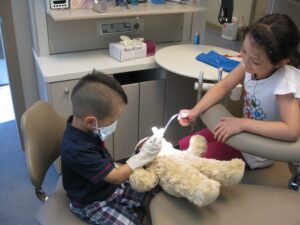How to Help a Child Who’s Afraid of the Dentist
A Balanced Approach to Comfort and Care

It’s not unusual for children to feel anxious about dental visits. As parents and caregivers, we want them to feel safe and supported. Fortunately, modern pediatric dentistry uses a wide range of tools—from gentle communication to safe sedation techniques—to help make dental care a positive experience.
Start with Trust: Nonpharmacological Behavior Guidance
Many children can be calmed using evidence-based, nonpharmacological behavior guidance. These techniques focus on communication, modeling, distraction, and environmental adjustments to ease anxiety and improve cooperation.
Some common strategies we used in our clinic include:
Tell-Show-Do (TSD): Explaining and demonstrating procedures using child-friendly language and visuals.
Modeling: Letting children observe a sibling or parents (or even their stuffy) calmly undergoing care.
Audiovisual distraction: Using tablets or videos to shift focus away from dental procedures.
Positive reinforcement: Praising cooperative behavior to encourage calmness and confidence.
Cognitive behavior techniques: Including relaxation breathing and imagery for older or more cognitively mature children.
Sensory-adapted dental environments (SADE): For children with special healthcare needs, adapting lighting, sound, and sensory inputs can dramatically reduce anxiety.
These approaches are often enough to support preventive care and minor treatments, and research shows they can significantly reduce anxiety, particularly when customized to a child’s personality and developmental level
When Sedation May Be the Kinder Option
Despite the best efforts, some children—especially toddlers, children with special needs, or those needing extensive or invasive treatment—may find even basic care overwhelming. This is where sedation becomes an important and safe adjunct.
Sedation is not about “knocking kids out”; it’s about helping them cope with care they’re not yet able to handle on their own. Some common situations where sedation is helpful include:
A very young age, when children cannot understand instructions or sit still.
An extensive treatment plan that would be too much to tolerate over multiple visits.
Procedures that are uncomfortable or complex, like extractions or nerve treatments.
Sedation exists on a spectrum and we will choose the least invasive approach appropriate for your child.
Types of Sedation we provide in our office:
Nitrous Oxide (“Laughing Gas”)
A mild, inhaled sedative that relaxes your child while keeping them fully awake. It’s fast-acting, reversible, and widely used for its safety and comfort.
Moderate Sedation (Oral Medication + Nitrous Oxide)
Combines laughing gas with prescribed medications. Your child becomes drowsy but remains responsive. They may or may not remember the procedure, which helps prevent long-term fear.
Deep Sedation / General Anesthesia
Reserved for children with complex medical needs, severe anxiety, or extensive treatment plans. This is done in a hospital setting where your child is completely asleep and unaware of the procedure.
All sedation is conducted under strict monitoring protocols according to AAPD guidelines. We adhere strictly to all safety measures include continuous monitoring of breathing, heart rate, and oxygen and carbon dioxide levels throughout and after the procedure.
A Personalized, Evidence-Based Decision: It’s a Team Effort
Supporting a child through dental care—whether using behavioral strategies, sedation, or both—is a collaborative process. Parents play a key role in preparation, communication, and reassurance. Every child is unique, and the right approach depends on their age, medical history, emotional readiness, and the complexity of their dental needs. At our office, we encourage a consultation not only to review your child’s medical and dental history, but also to get to know your child personally—their temperament, communication style, and comfort level in the dental setting. This visit allows your child to explore the environment and meet our team in a gentle, pressure-free way, which can be especially helpful if their previous dental visit didn’t go as planned.
We are trained to guide families through these decisions and ensure every child gets the care they need in the safest, most compassionate way possible. It is a common place for our clinic to combine techniques and customize strategies based on each family’s values and preferences.
If you have questions or are unsure about the best path forward, we are just a phone call away
(604) 638 6993
A gentle, positive dental experience can set the stage for lifelong oral health.
Leave a reply